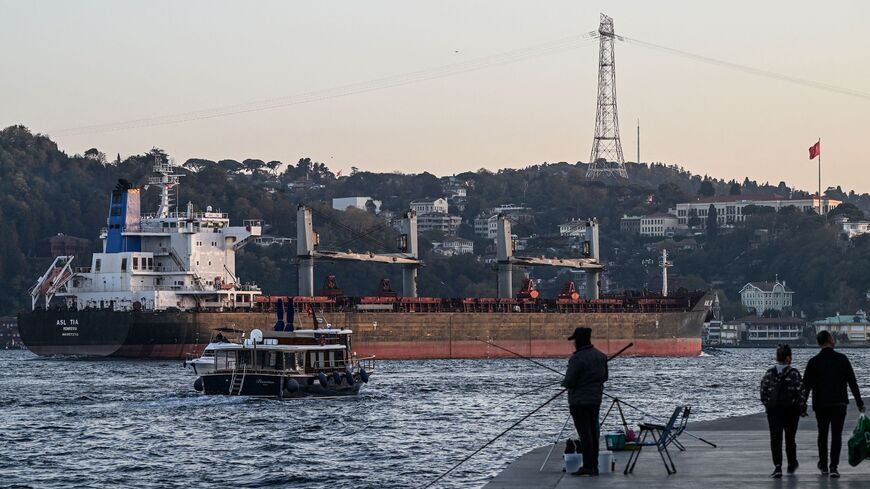Ukraine’s quest for new grain-shipping means bypassing Russia has put NATO member Turkey in a tight spot. Reluctant to confront Russia, President Recep Tayyip Erdogan is at pains to find a way to talk Moscow back into the grain corridor deal and avoid further escalation in the Black Sea.
A flurry of diplomacy has been under way since Russia’s exit last week from a UN- and Turkish-brokered deal that enabled Ukraine to export grain from its Black Sea ports via the Turkish Straits for the past year. Having effectively withdrawn safety guarantees for cargo ships, Russia doubled down with an announcement that it would deem all Ukraine-bound ships potential carriers of military cargo.
Ukrainian President Volodymyr Zelenskyy initially suggested that his country, the United Nations and Turkey could maintain the grain corridor without Russia. An aide to Zelenskyy said Ukraine was also pushing for a UN-mandated military patrol that would include Black Sea states such as Turkey and Bulgaria. But in comments on such suggestions on July 19, a UN spokesperson said that “no one can ask the Secretary-General to provide security guarantees” in a war zone. Zelenskyy discussed the grain corridor with Erdogan over the phone two days later, but few details have emerged from the call.
Another suggestion is for cargo ships to sail through Romanian, Bulgarian and Turkish territorial waters after loading grain from Ukraine.
Nevertheless, finding ships willing to sail to Ukrainian ports and insurance for them remain a serious problem, given the Russian threat.
According to Mykola Gorbachov, head of the Ukrainian Grain Association, Kyiv is planning to create a $500 million guarantee fund to protect ships. It will work “like a state insurance,” he said earlier this month. “For example, if Russia attacks, the state will cover all expenses.”
Reuters reports that many insurers have now suspended coverage of shipments from Ukraine. Additional war risk premiums, which are charged when entering the Black Sea area and need to be renewed every seven days, already cost thousands of dollars and could further increase, the agency noted.
Turkey insists on Russia
As the primary addressee of the alternative route proposal, Erdogan is unlikely to support any option without Russia. Though some of his recent moves have upset Russian President Vladmir Putin, Erdogan must stick to his balancing act in the Ukraine crisis. Turkey would not jeopardize its naval ships to assist vessels from Ukraine and is focused on reviving the grain corridor with Russian involvement, a Turkish official told Bloomberg. Similarly, Ukraine’s ambassador to Ankara said Turkey was interested in continuing the grain deal, stressing that it has leverage over Russia.
Even if cargo ships stay in the territorial waters of littoral states, they could still be targeted by Russian military vessels, aircraft or missile systems deployed in Crete. The risk of mines in the Black Sea also remains.
Stability in the Black Sea has long been a Turkish priority and any new arrangement could alienate Russia, so Erdogan will try all roads leading to the Kremlin.
He has been the sole NATO leader to argue that most of Ukraine’s grain exports go to Europe rather than poor African countries and that Russia’s own exports of grain and fertilizers remain obstructed. Such rhetoric has helped him maintain his dialogue with Putin. Since the latest NATO summit in Vilnius, he has spoken several times of hosting Putin in August, but Moscow has yet to confirm such a visit.
Russia has listed a number of conditions for returning to the deal, including the lifting of sanctions on its grain and fertilizer exports, allowing Russian agricultural lender Rosselkhozbank to reconnect to the SWIFT payment system, enabling deliveries of spare parts for agricultural machinery, removing obstacles regarding ship freight and insurance and unfreezing all Russian assets related to the agricultural sector. Finally, it says the corridor should recover its original purpose of helping poor countries.
According to UN data, out of 32 million tons of grain loaded from the Ukrainian ports of Odessa, Chornomorsk and Yuzhne, 14.3 million tons went to rich countries, including European Union members, while the poorest group of countries received only 822,000 tons. Africa’s share stood at 12%. Turkey was the third largest buyer after China and Spain.
Meanwhile, Russian grain accounts for 65% of Turkey’s grain imports, so Erdogan could ill afford to jeopardize it by acting as a guardian of Ukraine’s sales.
The relative calm in the Black Sea over the past year owed largely to the corridor deal. The day the agreement expired, Ukraine attacked the Kerch bridge linking Crimea to Russia and Russia bombed the ports of Odessa and Chornomorsk. The deal had also halted Russia’s plans to take Odessa. Recalling those plans before Russia’s termination of the deal Russian news site Vzglyad speculated that Russia might be preparing for a decisive move.
Its report read, “If the plans of the Russian command are to advance along the Black Sea coast in a bid to liberate not only Nikolaev, but also Odessa, the resumption of military action at sea is inevitable. And the safe transport corridor of the grain deal would only be a hindrance to that.”
Other options for Ukraine
If the Black Sea route remains out of use, Ukraine’s options include the Danube River and land and rail transport via Eastern European countries. After Russia’s invasion of Ukraine, the EU suspended tariffs on imports from Ukraine, but four EU members — Bulgaria, Hungary, Poland and Slovakia — banned domestic sales of Ukrainian grain to protect local producers. Those four countries along with Romania have since allowed transit through their territories for exports to Western Europe and elsewhere. Following the suspension of the grain corridor, they said the restrictions would remain in place.
Standing out among the alternatives is Romania’s port of Constanta. Its capacity amounts to half of Ukraine’s grain exports. The port handled 8.6 million tons of Ukrainian grain in 2022. In the first six month of this year, it handled some 15.2 tons of grain, including 7.5 million from Ukraine. But once Romania begins to export its own produce in mid-August, the remaining capacity for Ukraine would considerably decrease.
Ukraine has been trying to expand the capacity of its Reni and Izmail ports on the Danube, targeting a volume of 4 million tons per month. According to Bloomberg, the volume of crops shipped along the river has risen from 1.4 million tons to 2 million tons per month in the past year — a sign that Ukraine can use the Danube for half of its annual grain exports. The river is used to transport grain directly to buyers or to hubs like Constanta, but a heat wave has been lowering the level of the river, meaning that barges cannot be loaded at full capacity. Other alternative routes are all costlier.
The grain corridor crisis is testing the red lines of the parties in a conflict that has stoked the rivalry for supremacy in the Black Sea. With the UN cautious to stay above the fray, Zelenskyy is trying to draw NATO in. Upon his request, NATO and Ukrainian officials are expected to meet on Wednesday to discuss Russia’s suspension of the grain deal. After a phone call with NATO Secretary-General Jens Stoltenberg over the weekend, Zelenskyy tweeted that they had “identified … the future steps necessary for unblocking and sustainable operation of the Black Sea grain corridor.”
Earlier this year, Ukraine’s Foreign Minister Dmytro Kuleba had said, “It’s time to turn the Black Sea into what the Baltic Sea has become — a sea of NATO,” and called on NATO to integrate Ukraine’s air and missile defenses with those of alliance members in the region.
Turkey, however, is averse to upsetting the balance with Russia in the Black Sea, the cornerstone of which is the 1936 Montreux Convention that sets the rules of commercial and military traffic through the Turkish Straits. Ankara has abided by the convention since the outbreak of the Ukraine war to claim a status of a fair player.
Back in 1992, it had led efforts to create the Black Sea Economic Cooperation Organization between regional states, including Russia. Those dreaming of turning the Black Sea into “a NATO sea” got a boost when Romania and Bulgaria joined NATO in 2004. Yet Ankara made a strategic choice to not let US ships into the Black Sea during the Georgian-Russian war in 2008. NATO’s rapprochement with Ukraine and Georgia upped Russian sensitivity in the Black Sea. In 2014, Russia annexed Crimea, getting the upper hand in the rivalry in the Black Sea. NATO responded with a decision to boost its presence in the Black Sea in 2016. The strategic factor behind Turkey’s rejection of Crimea’s annexation is the upset Black Sea balance in favor of Russia, while the balancing of rivalry and interests has required it to not join the Western sanctions against Russia.








